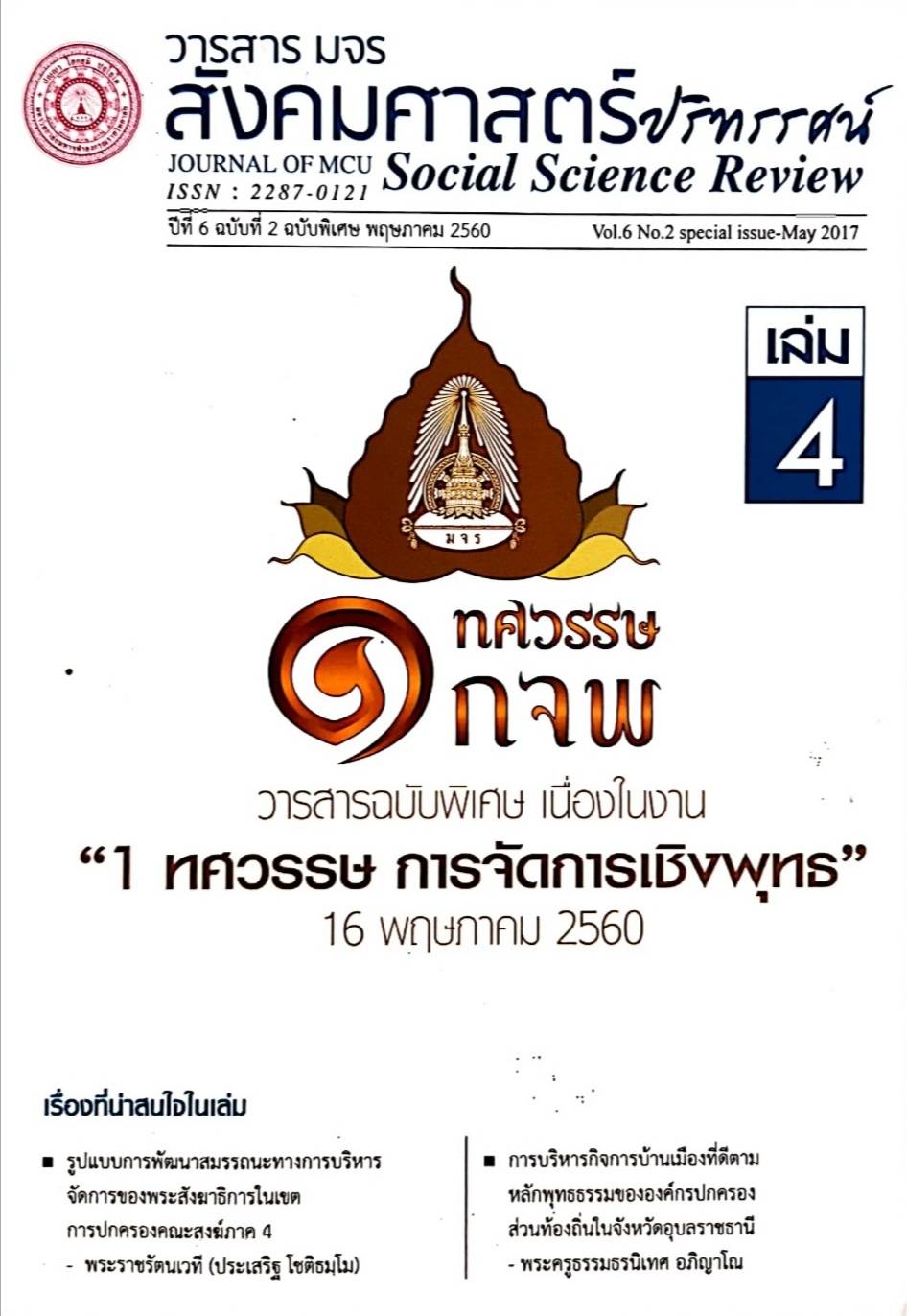ยุทธศาสตร์การมีส่วนร่วมของประชาชนโดยใช้หลักพุทธธรรมในการป้องกันยาเสพติด ในชุมชนกรุงเทพมหานคร
คำสำคัญ:
ยุทธศาสตร์การมีส่วนร่วมของประชาชน, หลักพุทธธรรม, การป้องกันยาเสพติดบทคัดย่อ
การวิจัยครั้งนี้มีวัตถุประสงค์ คือ 1. เพื่อศึกษายุทธศาสตร์การมีส่วนร่วมของประชาชนในการ
ป้องกันยาเสพติดในชุมชนกรุงเทพมหานคร 2. เพื่อศึกษาองค์ประกอบที่สนับสนุนยุทธศาสตร์ในการมี
ส่วนร่วมของประชาชนในการป้องกันยาเสพติดในชุมชนกรุงเทพมหานคร 3. เพื่อเสนอการพัฒนายุทธศาสตร์การมี
ส่วนร่วมของประชาชนโดยใช้หลักพุทธธรรมในการป้องกันยาเสพติดในชุมชนกรุงเทพมหานคร การวิจัยนี้
ใช้รูปแบบการวิจัยผสานวิธี การวิจัยเชิงคุณภาพ เก็บข้อมูลจากผู้ให้ข้อมูลสาคัญ จานวน 22 ท่าน พิจารณา
เลือกแบบเจาะจงจากผู้เชี่ยวชาญและประสบการณ์จริงในพื้นที่ชุมชน 3 แห่ง ในพื้นที่กรุงเทพมหานคร
เครื่องมือที่ใช้ในเก็บข้อมูล ได้แก่ แบบสัมภาษณ์เชิงลึก เก็บข้อมูลจากการสัมภาษณ์แบบตัวต่อตัว เก็บ
ข้อมูลจากผู้มีส่วนร่วมในการสนทนากลุ่มเฉพาะ จานวน 11 ท่าน และวิเคราะห์เนื้อหาเชิงพรรณนา
การวิจัยเชิงปริมาณ เก็บข้อมูลจากกลุ่มตัวอย่าง คือ ประชาชนผู้มีส่วนได้เสียในชุมชน
กรุงเทพมหานคร โดยการสุ่มแบบแบ่งชั้น จานวน 400 คน เครื่องมือที่ใช้ในการเก็บข้อมูล คือ
แบบสอบถาม ซึ่งมีค่าความเชื่อมั่นทั้งฉบับเท่ากับ 0.98 และวิเคราะห์ข้อมูลด้วยสถิติ เชิงพรรณา
ได้แก่ ค่าความถี่ ค่าร้อยละ ค่าเฉลี่ย และค่าส่วนเบี่ยงเบนมาตรฐาน ผลการวิจัย พบว่า
รูปแบบ 3 ส่วนร่วม 4 หลักแห่งความดี สร้างภูมิคุ้มกันยาเสพติด มีลาดับขั้นเริ่มจากการพัฒนา
1. การเรียนรู้-รู้คิดชอบ 2. ชุมชนเข้มแข็ง-หลักปฏิบัติแห่งความไม่เสื่อม และเครือข่าย-หลักสานมิตร
ไมตรีจิต ซึ่งทั้ง 3 ลาดับ เป็นรูปแบบการพัฒนายุทธศาสตร์ที่ได้หลอมรวมแก่นหลักพุทธธรรม
นาเสนอแบบเป็นสากลใช้ในป้องกันและแก้ไขปัญหายาเสพติดแบบเป็นองค์รวมไปพร้อมกับการแก้ไข
ปัญหาอื่น เป็นหนทางแห่งสันติวิธี เหมาะกับวิถีชีวิตสังคมไทย
เอกสารอ้างอิง
Bangkok. (2559). Plan of Bangkok Development duration 12 years (B.E.2552 – 2563), (Copy).
Kamollapop Yodborplub. (2007). Capacity Building of Community for Integrated
Prevention of Narcotics in Lower Northern Part of Thailand. Art
DoctoralThesis. Department social development: Naresuan University.
Panisara Beamukda. (2557).The Innovative Design Education System Sustainabilityby
The Principles of Buddhism: A Case Study Concept and Vision of Steve
Jobs. Journal of MCU Peace Studies, 3(2), 142.
Phakhusrivoraphinit and Sahataya viseat. (2558). Community Participation in
TheBuddhist Archaeological Management in Phayao Province. Journal of
MCU Social Science Review, 5(2) extra, 143.
Runtip Krahan and Bunchon Krahan. (2552). The Process of Protection and
Solution of Narcotics Problem with the Principle of Buddhadhamma in Pa
Phai Village, Mae Pong, Doi Sake District, Chiang Mai. Research Report.
Mahachulalongkornrajavidyalaya University, Chiang Mai: Mahachulalong
kornrajavidyalaya.
Samran Sompong. (2559). A Critical Analysis of Communication Pattern for
Peacein the Online Media by Buddhist Peaceful Means: A Case Study of
Komchadluek.Net. Journal of MCU Peace Studies, 4(1), 144.
Strategic Department of Office of the Narcotic Control Board. (2558). Strategic plan
of Prevention and Solving Narcotics Problems B.E.2558 – 2562. no place
of printing.
ดาวน์โหลด
เผยแพร่แล้ว
รูปแบบการอ้างอิง
ฉบับ
ประเภทบทความ
สัญญาอนุญาต
ลิขสิทธิ์ (c) 2020 วารสาร มจร สังคมศาสตร์ปริทรรศน์

อนุญาตภายใต้เงื่อนไข Creative Commons Attribution-NonCommercial-NoDerivatives 4.0 International License.
เพื่อให้เป็นไปตามกฎหมายลิขสิทธิ์ ผู้นิพนธ์ทุกท่านต้องลงลายมือชื่อในแบบฟอร์มใบมอบลิขสิทธิ์บทความให้แก่วารสารฯ พร้อมกับบทความต้นฉบับที่ได้แก้ไขครั้งสุดท้าย นอกจากนี้ ผู้นิพนธ์ทุกท่านต้องยืนยันว่าบทความต้นฉบับที่ส่งมาตีพิมพ์นั้น ได้ส่งมาตีพิมพ์เฉพาะในวารสาร มจร สังคมศาสตร์ปริทรรศน์ เพียงแห่งเดียวเท่านั้น หากมีการใช้ภาพหรือตารางหรือเนื้อหาอื่นๆ ของผู้นิพนธ์อื่นที่ปรากฏในสิ่งตีพิมพ์อื่นมาแล้ว ผู้นิพนธ์ต้องขออนุญาตเจ้าของลิขสิทธิ์ก่อน พร้อมทั้งแสดงหนังสือที่ได้รับการยินยอมต่อบรรณาธิการ ก่อนที่บทความจะได้รับการตีพิมพ์ หากไม่เป็นไปตามข้อกำหนดเบื้องต้น ทางวารสารจะถอดบทความของท่านออกโดยไม่มีข้อยกเว้นใดๆ ทั้งสิ้น





